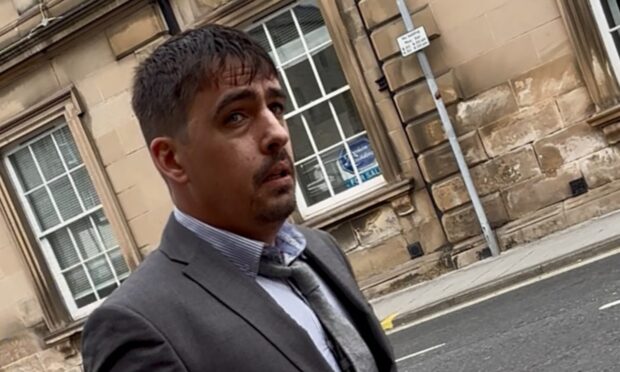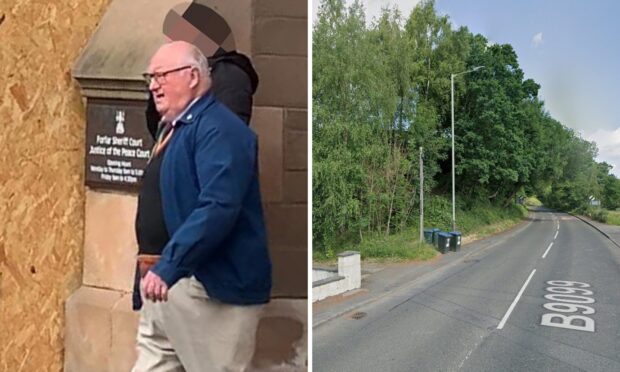After Grace Ross was given unpaid work for causing the death of her boyfriend in a horrific accident, The Courier has taken a look at the reasons for the decision.
Ross, 21, killed Joshua Kerr by driving into – and then over – him after they had argued about money at his workplace in Leslie, near Glenrothes, in 2020.
He did not survive the catastrophic injuries suffered when the car wheels drove over his head.
Ross – about to embark on a politics course at Dundee University – was originally charged with murder.
However, this was reconsidered and she was due to stand trial for causing death by dangerous driving.
A plea deal meant she pled guilty to causing death by careless driving – a far lesser charge.
Why was she not jailed?
Had Ross been found guilty of murder, she would have received a life sentence.
Had the death by dangerous driving charge been pursued successfully, the sentence could have been 14 years behind bars.
It will never be known why the authorities decided to prosecute on the lesser charge or why they accepted a plea to an even lesser offence.
Those deliberations are kept private.
However, having accepted the plea, the judge was bound to consider a non-custodial sentence, with 300 hours unpaid work the maximum available.
He said: “Because you have not previously served a custodial sentence, I am entitled to impose such a sentence only if it can be said that there is no suitable alternative.”
Ross is only 21 – is age a factor?
In his sentencing statement, judge Lord Braid leaned heavily on recently-introduced sentencing guidelines for people under the age of 25.
In all cases, the circumstances of an accused are weighed against their actions and consequences.
But since the start of the year, people under the age of 25 are treated differently to take into account their best interests.
As such, every option other than prison is explored fully, including their chances of rehabilitation.
In short, there is considered greater opportunity to change and prison is a last resort.
Lord Braid told Ross: “You are now aged 21.
“As such, I am required to, and do, have regard to the Scottish Sentencing Council Guideline on Sentencing Young People.
“That is relevant in the present case in two ways.
“First, I must take into account that your lack of maturity might have contributed to the manner in which you drove; second, any sentence which I pass should be different from the sentence which might have been passed on an older person.”
Is genuine remorse worth anything?
Genuine remorse certainly is – and it is hard to fake in the rigorous reports drawn up prior to sentencing.
Judges will look carefully at the attitude to their crime of a convicted person.
In this, Ross’ actions and attitude almost from the moment of the accident were critical.
Lord Braid noted she went to her partner’s assistance to administer first aid and called the emergency services.
He said: “You have always expressed genuine regret and remorse for your actions on 22 May 2020.
“I have the benefit of a Criminal Justice Social Work Report which, among other things, confirms that your remorse is genuine and that you accept responsibility for the consequences of your actions.
“It also states that you recognise and acknowledge the devastating impact of your actions not only on Mr Kerr but on his family and friends.”
Does the effect on the accused matter?
In short, yes it does, especially with younger people.
Lord Braid was not entirely unsympathetic towards Ross.
He noted the couple had been together for three years, since their school days and Mr Kerr had lived for 18 months with her family.
He said: “Understandably, his death and the manner of it have also had a severe and long-lasting impact on you.
“A psychological report lodged on your behalf discloses that you suffered from PTSD and mental health difficulties as a result of the incident and its aftermath.”
Ross’ offer of a university place was withdrawn when she was accused of murder.
She has remained out of trouble and was deemed a low risk of committing further offences.
Could she have received a lighter sentence?
That’s unlikely.
Lord Braid had to judge the standard of the driving which led to Mr Kerr’s death.
He placed it “somewhere in the middle of the range or spectrum of culpability” with her failure to avoid Mr Kerr balanced against the low speed and fact the lack of care lasted only seconds.
He went on: “Because of the gravity of the offence, and its consequences, I am satisfied that the custody threshold is met; in other words, that everything else being equal, a custodial sentence would be merited.
“However, because of the mitigating factors to which I have alluded as well as your age and your plea of guilty, saving the need for a trial, I have come to the view that it cannot be said that there is no suitable alternative to imprisonment.
“There is a suitable alternative, namely a high-end community-based disposal together with a lengthy period of disqualification from driving.”
For all the latest from the court rooms of Tayside and Fife, join our Facebook group.





















